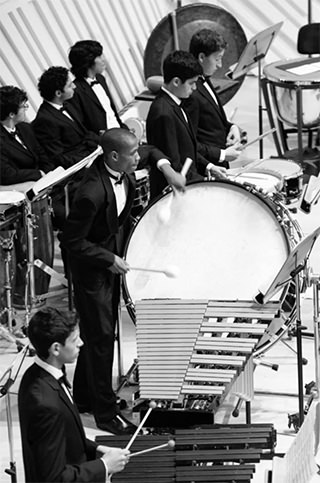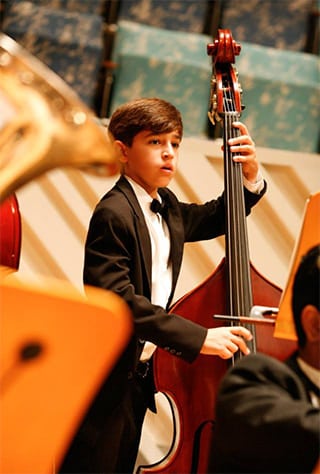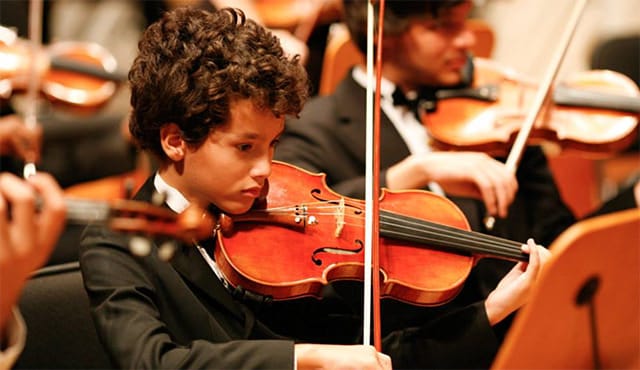Miami Music Project
On December 12, 2014, at 7:00 pm the Miami Music Project Children’s Orchestra will perform at the Wertheim Performing Arts Center of the Florida International University under the baton of Maestros Abiram Brizuela, Liber Cuervos and Martin Mayo, a talented member of the Miami Music Project Children’s Orchestra that will debut as conductor.
The program includes pieces by Handel, Bach, Mozart, and Rossini; the event is free of charge and brings an outstanding opportunity to witness the remarkable talent of Miami’s Youth.
Miami Music Project is an El Sistema inspired program that uses music as an instrument for social transformation, empowering children to acquire values and achieve their full potential, positively affecting their society through the study and performance of music.
The program was founded by Maestro James Judd in 2009 and is currently serving children at four different locations including Liberty City, Little Haiti, Little Havana, and Doral, in which over 400 students receive free music education in an environment that promotes impactful social development.
Abiram Brizuela, an El Sistema Alumnus, is the Director of Programming of the institution and as stated by Miami Classic, one of the young leaders in Miami’s Classical Music Scene.
El Sistema
El Sistema is a tested model of how a music program can both create great musicians and dramatically change the life trajectory of hundreds of thousands of the nation’s neediest kids. Within El Sistema, the Orchestra serves as a miniature representation of the community, where many people work together with established roles and levels of responsibility to achieve a common goal. El Sistema’s approach to music education emphasizes intensive ensemble participation from the earliest stages, group and individual learning, peer teaching and a commitment to social development through excellence in music education.
El Sistema was founded in Venezuela by José Antonio Abreu over 35 years ago to serve the population of children in need of music education. Abreu wanted a way to give access to elite classical training to all who wanted, especially those of low socioeconomic status.
El Sistema is, therefore, an untraditional music education model that works! Even great musicians, like Gustavo Dudamel, have been trained through El Sistema. But the best part is that the focus of El Sistema is on the whole individual, not just on building virtuosity in music so that the life of a child can be enriched.


The Five Fundamental Principles of El Sistema
Social Change: The primary objective is social transformation through the pursuit of musical excellence. One happens through the other, and neither is prioritized at the expense of the other.
Ensembles: the focus of El Sistema is the orchestra or choral experience.
Frequency: El Sistema ensembles meet multiple times every week over extended periods.
Accessibility: El Sistema programs are free, and are not selective in admission.
Connectivity: Every núcleo (chapter) is linked at the urban, regional and national levels, forming a cohesive network of services and opportunities for students across the country.
The great news is that El Sistema is in action right here in our city! Miami Music Project Children’s Orchestra is an El Sistema – modeled free after school music program. It is the best resource for children and youth to gain an excellent music education.
After I had the opportunity to study in a Musical school and be part of the Youth Orchestra of the Emil Friedman School, I found this project extremely necessary for the support and development of young kids around the world, not everybody has the opportunity or the resources to be part of an Orchestra, but what the system offer to this kid is a life-changing opportunity, where all the problems and all difficulties this kid might be facing because are forgotten as soon as they take in their hands a musical instrument.
Professor Emil Friedman always said there is no culture without Musical Culture, and he could not be more right, today the musical instruments are not reserved for a few groups of people but to all the kids who want to be part of this beautiful system.
Today is about one thousand Sistema-inspired program sites in nearly 55 countries, including all continents except Antarctica.




